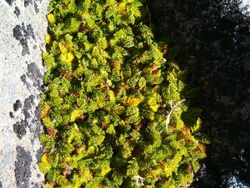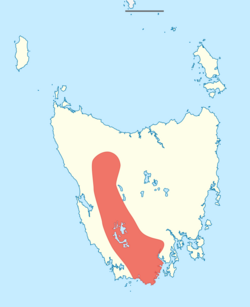Biology:Anisotome procumbens
| Anisotome procumbens | |
|---|---|

| |
| Scientific classification Error creating thumbnail: Unable to save thumbnail to destination
| |
| Kingdom: | Plantae |
| Clade: | Tracheophytes |
| Clade: | Angiosperms |
| Clade: | Eudicots |
| Clade: | Asterids |
| Order: | Apiales |
| Family: | Apiaceae |
| Genus: | Anisotome |
| Species: | A. procumbens
|
| Binomial name | |
| Anisotome procumbens (F.Muell.) C.J.Webb
| |

| |
| Synonyms[1] | |
| |
Anisotome procumbens, the mountain celery,[2] is a small, perennial herb endemic to the Australia State of Tasmania.[3] It is primarily found in high-elevation habitats in the west and south-west of the island.[4]
Taxonomy
Anisotome procumbens was first described as Gingidium procumbens by Ferdinand von Mueller from plants collected at Mount La Perouse, Tasmania by A. Oldfield.[5]
Description
Anisotome procumbens is a mat- or cushion-forming perennial herb with glossy, bright green, deeply divided leaves in a basal rosette and an umbellate inflorescence typical of the family. Some of the dolerite mountaintops of south-eastern Tasmania, such as Adamsons Peak and Hartz Peak have healthy populations of A. procumbens. At these locations, individual mats can reach over 2 m in diameter.[4]
References
- ↑ APNI. "Anisotome procumbens (F.Muell.) C.J.Webb". https://biodiversity.org.au/nsl/services/name/apni/119249/api/apni-format. Retrieved 18 May 2018.[yes|permanent dead link|dead link}}]
- ↑ Wapstra, H; Wapstra, A; Wapstra, M; Gilfedder, L (2005). The Little Book of Common Names for Tasmanian Plants. Hobart, Tasmania: DPIPWE. ISBN 0-7246-6365-7. http://dpipwe.tas.gov.au/Documents/Common_names_booklet.pdf. Retrieved 7 May 2018.
- ↑ de Salas, M. F.; Baker, M.L. (2017). A Census of the Vascular Plants of Tasmania, including Macquarie Island. Hobart, Australia: Tasmanian Museum and Art Gallery. p. 7. http://tmag.tas.gov.au/__data/assets/pdf_file/0003/154164/2017_Census_of_Tasmanian_Vascular_Plants.pdf.
- ↑ 4.0 4.1 Curtis, W.M. (1963). The Student's Flora of Tasmania, Part 2. Hobart, Tasmania, Australia: Government Printer. p. 261.
- ↑ von Mueller, Ferdinand (1858). Fragmenta Phytographiae Australiae. Melbourne, Australia: Victorian Government Authority. p. 15. https://biodiversitylibrary.org/page/760537. Retrieved 18 May 2018.
External links
Wikidata ☰ {{{from}}} entry
 |

